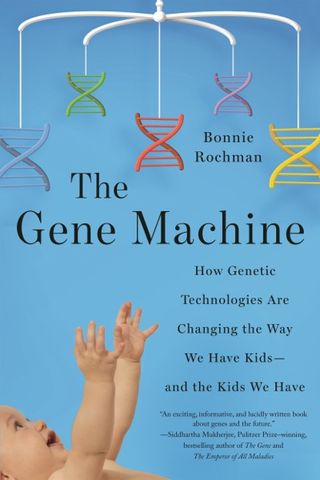Genetics
What Is the Future of Genetic Testing?
A new book explores what genetic testing means for you and your kids.
Posted March 17, 2017

Twenty-four years ago, when I was living in London and pregnant with Jack, my first son, I had a prenatal ultrasound but not amniocentesis. I don’t remember doing any kind of blood test for genetic testing. Though back then in the U.K., blood was sometimes drawn without providing the same kind of detailed explanations they offered in the U.S. Maybe I had been tested for things without my knowledge.
In any event, during my next pregnancy (with twins), the technology was bumped up. I’m not sure if that was due to the change in time (two years later and more options) or change in locale (NY versus London). That time around, I had ultrasounds, an amniocentesis, and a blood test to check for a few of the genetic diseases that run in Jewish families.
For my final pregnancy, nearly 18 years ago, the number of genetic tests seemed to balloon faster than, well, my belly. It was nerve-wracking to hear all the things that could possibly be wrong. Fortunately, all went well.
I hadn’t given much thought to those pre-partum days until I picked up Bonnie Rochman’s The Gene Machine that explores the biology and bioethics of genetic testing. It’s a smart and compassionate read—not just for those of you who are considering parenthood but anyone with any interest in the future of medical testing and its impact on our health decisions. I recently had the opportunity to ask Rochman a few questions about her research:
RHE: You write with the perspective of a veteran health reporter and also as a pregnant woman offered an array of genetic tests. Was the impetus to write this book because you feel that we live in this wonderful time of information or because you feel parents need to be wary about a flood of too much information?
BR: Both! There is no question that we do live in an incredible era of access to information about our children’s genetic makeup. So much of this information is illuminating and empowering, enabling parents to make more informed decisions about pregnancy and their children’s health. And that’s a great medical achievement. But it’s important to understand the limitations of some of the information we can tap into. The more comprehensive the test, the more likely it is to reveal information whose impact may not be totally clear. For example, tiny deletions or duplications of DNA may indicate a serious problem or they may be of little or no significance. Our understanding of what these changes mean lags far behind our ability to deploy these genetic technologies. You can see the challenges this presents.
RHE: Did your research confirm your hunches, or did your research surprise you in any way?
BR: When I first started researching this topic, I was a little in the thrall of all this amazing genetic technology. How cool is it that we’re now able to test all 20,000-plus genes at once, rather than painstakingly examining them one by one? But I was overly naive and didn’t give enough thought to the sobering truth that the more you peer into your genes the more apt you are to find problems. For example, there was one study that really sparked my interest in exploring this subject further: It asked a bunch of parents if, hypothetically, they would want to test their kids for some common diseases of adulthood, such as high blood pressure, high cholesterol and diabetes. Parents overwhelmingly said yes, anticipating that their kids would get a clean bill of health. Yet these diseases are so common that, on average, each kid would have nine variants, or gene changes, indicating increased risk for these conditions. I was really surprised by that. It made me realize that the saying “no one is perfect” rings true not only from a psychological perspective but within a biological frame of reference too
RHE: The buzz word these days among geneticists is "CRISPR." Can you explain what this is and how it relates to the future of babyhood?
BR: For starters, CRISPR has nothing to do with the opposite of soggy, which is what my kids suspected. It’s an acronym for Clustered Regularly Interspaced Short Palindromic Repeats. CRISPR is a tool to edit genes. It’s sometimes called CRISPR-Cas9 because it relies upon a protein called Cas9 to zero in on a particular defective DNA sequence and repair the mistake. Although it’s currently being used to try to address disease, many researchers expect that its power will eventually be used for less noble purposes — for enhancement, not curative purposes. For example, scientists are working on using CRISPR technology to repair muscle damage in children with Duchenne muscular dystrophy. If they’re able to crack the code, it doesn’t take too much imagination to predict a future where parents may try to apply that breakthrough to embryos or infants to build a better, stronger baby.
RHE: What should parents want to know or what should they ask?
BR: Parents should ask for clarity about what sort of information they can expect to learn from any genetic testing they choose before, during or after pregnancy. So many parents I interviewed told me that they didn’t really understand what they were getting into when they said “yes to the test.” It’s a good idea to ask if results are definitive or only indicative of increased risk of disease. The answer can help you decide whether to proceed with a particular test. It can also be very helpful for parents to ask themselves why they’re doing testing in the first place. If test results wouldn’t change the course of a pregnancy, for example, it might prompt some thoughtful consideration of whether testing is worthwhile. Genetic testing is an extremely personal decision. What one person finds helpful another person might find anxiety-inducing. There’s a broad spectrum of decision-making.


